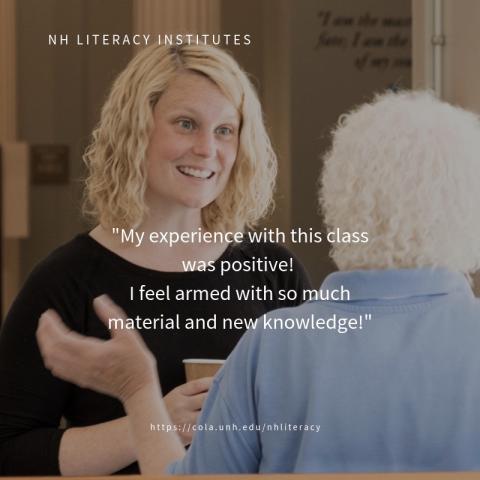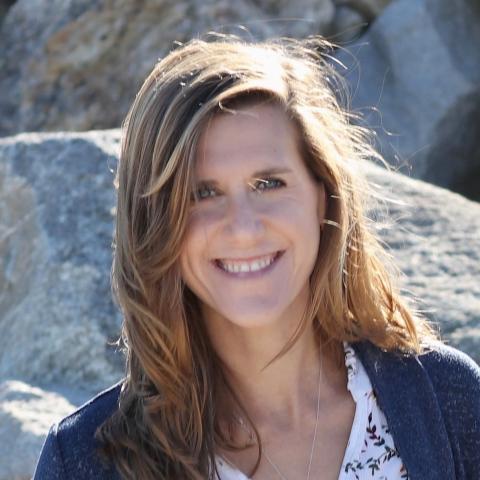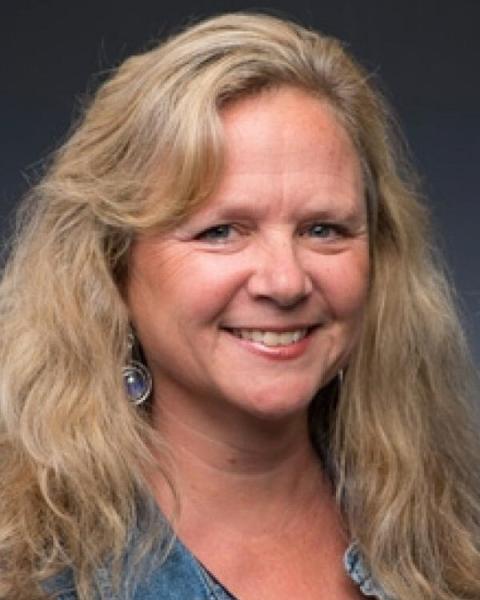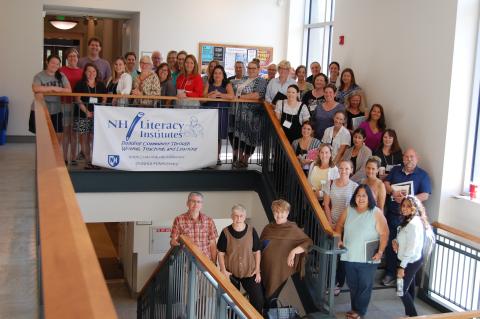
Summer 2026 Course Catalog
Now Available
Registration Opens March 23rd, 2026
July 6th-10th
ENGL 920, 8:15am-2:30pm in person plus two additional virtual classes. (3 credit)
Teaching reading and writing within prescribed curricula can sometimes feel like a treadmill—high expectations, pacing guides, and standardized goals can overshadow the joy of learning.
This graduate course invites teachers to reconnect with the passion that drew them to the classroom. Through opportunities to revisit what we know about children and learning, reflect on what’s working and what isn’t, and remix required assignments into engaging, student-centered experiences, participants will explore strategies to reimagine instruction, recharge their creative energy, and reenergize their classrooms.
By the end of the course, teachers will have practical tools to balance curriculum demands with authentic, joyful reading and writing experiences for every learner.
Instructors:

Ashley Healeyis a National Board Certified Teacher out of Stratham, New Hampshire where she works as Teacher Librarian. An avid reader and writer, Ashley strives to build strong literacy identities in her students. She believes in student empowerment, finding joy, and being true to oneself. She engages regularly in professional growth through Learning Through Teaching and the Summer Literacy Institute. While she spends her school year with our youngest learners, for the past 11 summers, she has enjoyed writing alongside the 5th-8th grade writers at the UNH Writers Academy.

Whitney Forbesis a first-grade teacher in Stratham, NH. Over the past thirteen years, she has taught diverse learners at the elementary level with an emphasis on literacy, advocacy, equity, and joy. Through inquiry and play, Whitney helps to develop her students' literary identities. Engaging in writing and reflection within and outside of the classroom have been powerful tools for Whitney's personal and professional development. She is excited to teach and learn at the Summer Literacy Institute alongside other passionate educators, readers, and writers.
ENGL 919, 8:15am-2:30pm in person. (2 credit)
Are your students full of ideas but struggling to get them onto the page?
This hands-on, one-week graduate course is designed for teachers who want practical, research-based tools to help struggling writers succeed—without adding more to their plates. Using evidence-based practices and methods, participants will learn how to make writing visible, explicit, and teachable for all students, especially those who struggle with writing, organization, sentence construction, and academic language. This course shows teachers how to help students understand how language works to create meaning across different types of writing, in ELA, but also in Science, Social Studies, Humanities, ELL, etc.
Teachers will explore real classroom texts and student writing, learn how to break down complex writing tasks, and practice scaffolding instruction so students can confidently write narratives, explanations, and arguments. The strategies learned are immediately applicable and especially powerful for multilingual learners and reluctant writers.
By the end of the week, participants will leave with ready-to-use lessons, language scaffolds, and a deeper understanding of how to support student writing growth. This course is ideal for teachers who want clear tools, practical strategies, and a fresh way to think about teaching writing in their classrooms.
Instructor:
Dr. Christina Ortmeier-Hooper is an Associate Professor of English. She is the Director of the Summer Literacy Institutes, as well as the co-director of the SLATE program. She began her teaching career as an English and ESL teacher in secondary schools. She has also served as the director of First-Year Writing at the University of New Hampshire. Her research interests continue to reflect her investment in school-university collaborations, writing teacher education, and adolescent literacy.
July 13th-17th
ENGL 911, Monday-Friday, 8:15am-2:30pm
Come explore the notebook as a creative laboratory, a slow sacred space where observation, imagery, and poetic language thrives and grows; a place to collect and capture the ordinary and the extraordinary as we develop voice, form, rhythm, and metaphor. Poetry gives notebooking purpose and structure, helping the writer identify patterns, passions and emergent themes.
Through a blend of seminar discussion, guided writing sessions, and close reading of contemporary poets, we will practice using the notebook to gather fragments, sensory details, sketches, and moments from lived experience.
The course emphasizes low-stakes, high-frequency writing as a method for cultivating poetic inquiry, as well as strategies and classroom practices for poetic notebooking with students.
(No previous notebooking experience is required)

Tomasen M Carey is a Senior Lecturer in the English Department at the University of New Hampshire where she is the Field Coordinator of the Learning Through Teaching Program and Director of UNH Writers Academy for youth. She is the voice behind the blog, Conversation Education (https://conversationeducation.com/) where she shares resources, questions the current state of education, and reflects on her work and her own literary life.
July 20th-24th
ENGL 919.01, 8:15am-2:30pm in person plus two additional virtual classes. (3 credit)
For hundreds of years writers have combined genres in a single work of literature: think of modern literature for children and young adults. Think, too, of classic literature like Moby Dick, John Dos Passos’ trilogy USA, and the poetry and copper etchings of William Blake. Blending genres is nothing new. Doing so in academic settings, however, is rare, though not as rare as it was before multigenre writing burst into classrooms in the late 1980s. Since then, some teachers at just about every level of education across the land are leading students into writing multigenre research papers. Participants in this course will explore how to weave multigenre into their curricula, how to support students in their multigenre projects, and how to assess students’ growth and accomplishment. For the culminating project, participants will create their own multigenre research papers about personally important topics. Topics and activities include:
• Daily writing workshop
• Conferences with instructor
• Peer response to writing
• Study and practice of various genres/subgenres
• Evaluation of multigenre papers
• Examination of how multigenre meets CCSS
• Speculation about how multigenre fits into the K-12 curriculum
• Strategies to communicate the impact of MGP to school leadership
Instructors:
Tom Romano is retired from Miami University. He gardens, reads, and writes what comes along. His most recent book is A Boyhood at Red’s: Growing up in His Dad’s Neighborhood Bar. He and his wife live in Oxford, Ohio, where he spends considerable time walking Rocco, their two-year-old mafioso Cavachon. He can be reached at romanots@miamioh.edu
Angela Gomez is an 8th-grade English Language Arts teacher at Seth Low Middle School in Brooklyn, NY. She earned her MST from the University of New Hampshire in the summer of 2020. Over the past nine years, Angela has been an advocate for cultivating an organic joy for reading and writing in her classroom. She helps lead curriculum teams focused on integrating Social-Emotional practices for both students and teachers, as well as developing curriculum that supports a Multi-Tiered System of Supports (MTSS) for the diverse learners in her school community. Angela previously co-taught a course at UNH, The Mindful Teacher, and is excited to join Tom Romano to share the benefits that Multi-Genre Projects have to offer.
July 27-29
15 PD Hours, $399
Monday-Wednesday, 8:15am-2:30pm
Field trip based workshop
(Can be taken for 2 graduate credits with prior approval of Literacy Institute. Credit option extends the workshop by two additional days where teachers will work together to research and create lessons to be used in their classrooms.)
This three-day workshop will bring together teachers and cultural leaders who will share best practices on incorporating archival materials in teaching language arts, social studies, and humanities. The course is also a wonderful experience for librarians and coaches. We’ll go on a walking tour of the Black Heritage Trail of New Hampshire and visit the historical site of the African-American novelist, Harriet E. Wilson, in New Hampshire. With historian and digital archive specialist, Kabria Baumgartner, we will learn how to integrate these powerful first-hand accounts and stories, along with other primary source materials, in our classrooms. Recommended for teachers, coaches, and librarians in Grades 3-12,
This workshop, which can be taken for graduate credit, explores storytelling, primary sources, digital archives – bringing together language arts, research, humanities, and social studies-- to illustrate how teachers, coaches, and librarians can successfully bring these resources and stories into their curriculum and classrooms. We ask three central questions:
How can we use archival material to enrich our reading and analysis of literary texts written by underrepresented writers and historical community members?
What are some stories of freedom in New England that we might share?
What kinds of products might students produce in working with these resources?
We can arrange transportation to sites if needed.
Instructors:
Dr. Kabria Baumgartner
JerriAnn Boggis
Dr. Christina Ortmeier-Hooper
Amy Steinberg
Course Registration
For returning students, please register via Webcat when the window opens.
For students who have never taken a class, or it was prior to Summer 2024:
Continuing Education Registration
New to our courses? Contact Amy.steinberg@unh.edu for assistance.

Summer Institutes
The NH Summer Literacy Institutes consist of graduate level courses offered for one week (2.0 credits) or one week plus additional remote learning (3.0 credits), as well as non-credit workshop options. Classes will be held weekly in July, running Monday through Friday from 8:15am-2:30pm.
Feel free to email us at nhliteracy.institute@unh.edu with any questions. If you aren't already following us on social media, check us out on Instagram, Facebook, or Twitter!